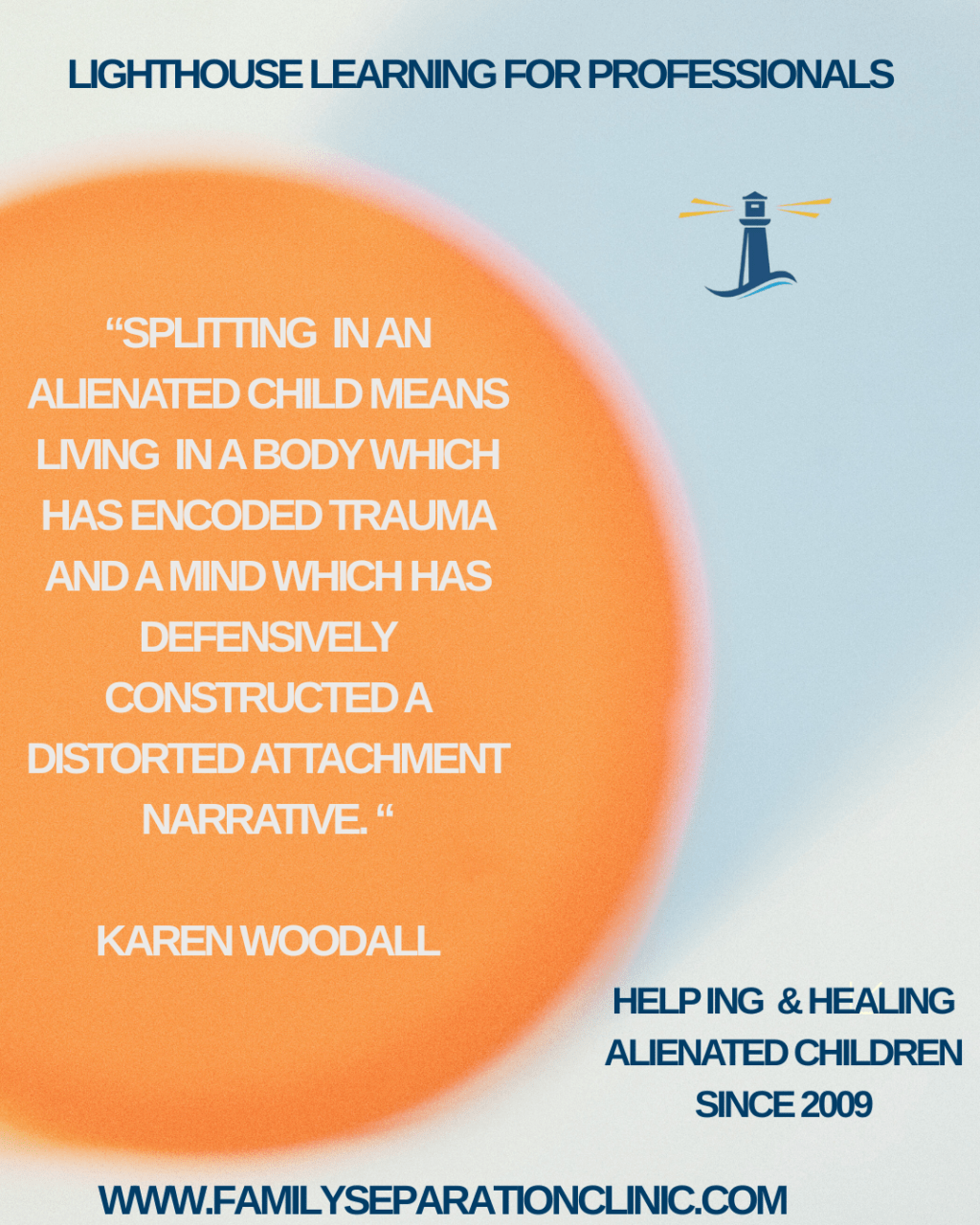We are discussing empathic responding with an alienated child at the moment. So far we have looked at the concept of walking a mile in your child’s shoes in order to understand the different pressures placed upon them. Last week I asked you to find a photograph of your child and put it somewhere prominent so that you could practice sending your love towards your child on a daily basis, thinking only of the positive feelings you have for them and letting the negative ones, engendered by their alienated position, drop away.
This week we are going to look at how, as an alienated parent, you are in the unenviable position of being damned if you do and damned if you don’t and how, if you understand the position you are in, you can shape your responses to your children to influence them differently.
This series of posts is for those who are still in relationship with their children or whose children are emerging from an alienated state. I will write specifically for those who are not seeing their children at all next.
When you are in the position of being or becoming the targeted or alienated parent it is important for you to understand what is happening fast. As the targeted parent, you are the one upon whom, all of the negativity around the ending of the relationship is being projected. You are the scapegoat, you are the route your child uses to protect themselves from the horror of the holocaust surrounding them and you are the parent that they have decided can cope over the longer term with the loss of a relationship with them. You are also, paradoxically, the parent that they bet upon being there when the chaos dies down. In their minds you are the stronger, kinder, more objective parent, the one that right now they can afford to do without. Because when an alienation reaction takes hold, children who choose to lose a parent, are usually being unbearably pressured by the parent that they live most of their lives with. This parent is usually, though not always, their mother but whether it be mother or father they align themselves with, this parent will be skilled at emotional manipulation, guilt tripping, outraged self righteousness, long standing public suffering and will, themselves, usually be involved in significant campaigns to ‘split’ the family into good and bad. Children align themselves most to the parent who plays the blame game and given that most children are living most of the time with one parent involved in this kind of mind manipulation, it is little wonder they cave in eventually and split up their own feelings into good and bad.
I said last week that children who split and who go into an alienation reaction want you to confirm for them why they should reject you. This leads to all sorts of horrible behaviour in children which often mirrors the outraged self righteous indignation that is displayed by the aligned parent. A child who is regularly saying ‘I don’t want to…come withyou/have you as my parent/love you/like you/do this/do that….is entering into the alienation reaction and at this stage you must do everything you can and more to avoid giving them justification for escalating it.
But here again you are damned if you do and damned if you don’t because if you give them justification they will escalate the reaction and if you don’t give them justification they will also escalate the reaction. So what do you do, when a child is entering into the alienation state, or, conversely, is coming out of the alienated state (when they will often display behaviours in reverse order.
Let me explain that last bit just for clarification.
Children entering into an alienated state will usually follow this route –
Passive resistance – they will say they don’t want to see you/don’t want to stay over/try to reduce their time with you. When they are with you they will sulk and not want to do things.
Resistance – they will start to create situations which cause trouble and which allow them to avoid being with you, you will often want to simply send them home.
Active resistance – they will avoid coming with you when its time to do so, they will create scenes at handover, they will start to tell the parent they live with most that they don’t want to go, they will become hysterical, they will be obnxious in your company if you do get them to come with you.
When children come out of the alienated state they will often go through these stages in reverse order, ping ponging back and forth between them so that you are not quite sure what is going on. A child might contact you in active resistance for example and demand that you do things for them and then, shortly afterwards, might hop straight over to passive resistance and spend some time with you that isn’t quite normal but isn’t actively resisting either. Knowing where your child is in the alienation process is critical if you are going to use empathic responding in any of your encounters with your child.
Similarly, a series of emotional states accompanies each of the stages of alienation. In order for a child to become alienated they have to amputate their conscience in relationship to you and so they go through a process of disabling their ability to feel guilt or shame about their rejection of you. A child in passive resistance can still locate normal feelings of guilt and shame whilst a child in resistance is seeking help from you to disable those feelings by creating circumstances in which you behave in ways that contribute to the chaos. When you do you are inadvertently confirming for the child why they should reject you and as you do so you are helping them to amputate their normal conscience in relationship to you. This is why, when a child is behaving badly in an alienation reaction, you must take care not to contribute by being overly aggressive, overly pushy or overly demanding. Difficult I know, but important to understand and keep in your toolbox for parenting an alienated child.
A child in active resistance has fully split up their feelings and can no longer feel guilt and shame in relationship to you. Interestingly, one of the anecdotal evidences of a child who has fully split in their feelings, is that they seem to do incredibly well at school and the aligned parent will parade their ‘goodness’ and their achievements as evidence of how not seeing you has helped them to blossom. The reality is that the child is no longer coping with the demand to relate to two parents who are in conflicted positions and they are, as compensation for the terrible ‘choice’ they have made, trying desperately to show that they are good children. What they are however, are children removed from connection to normal feelings of conscience and as such they are in a very vulnerable emotional and psychological state.
First stage empathic responding with an alienated child means understanding how vulnerable your children are and what you need to do to assist them. You need to become, very quickly, an adept at parenting an alienated child, which means removing from yourself all of the hooks that we discussed last week, focusing upon letting love flow towards your child within your mind and heart and then being willing and able to sow seeds of doubt at every opportunity.
Sowing seeds of doubt is an immediate task that creates mid and longer term opportunities for you to revisit and use in the future. Your seeds of doubt need to be nurtured and cared for so that they will eventually blossom into the flowers of hope for reunification. Seeds of doubt are less about direct explanation and more about challenging perceptions, they are usually unvocalised and they are symbolic in nature. First stage empathic responding with an alienated child is about challenging their determination to use you as the repository for all that is negative, bad and wicked about their world. Sowing the seeds of doubt is about your child encountering the love you feel for them on a consistent basis and about experiencing you over time as a containing adult who can face what they are throwing at you. Sowing seeds of doubt can arrest an alienation response and it can expedite a recovery from alienation. Sowing seeds of doubt means that every time your child encounters you, they experience something other than what they have been made to believe about you.
So what has your child been made to believe about you? This week I want you to spend time thinking as clearly as possible about the things that your child’s other parent has used to create you as the shadow in the child’s mind. How have you been demonised, how have you been set up to be the place where the negativity can be dumped, what is it about you that has created this circumstance right here, right now?
In writing this I can hear the uproar of outrage that I should suggest that an alienated parent has somehow created his own fate. I can see the posts denying that any such dynamic exists. Let me tell you this. In each and every single case of alienation that I have ever worked with, the alienated parent has contributed something, somehow. Even in those very severe cases, where personality disorder drives the child into rejection, the target parent has not been perfect. I am not asking you to find what you have done that has caused this, I am not asking you to accept the blame. I am asking you to consider what it is about you that meant that you could become the disposable parent in the child’s mind. Were you too pushy, too aggressive, too passive, too confused, too malleable, too tired, too frustrated. What? What was it about you that put you in that position?
Know yourself, know your child and know the other parent inside out, just as they know you inside out and have used whatever it is about you to create this split and make you and not they the rejected parent.
And when you know yourself and them and how, you will know how to do something different and when you do something different you start sowing the seeds of doubt.
This week I want you to get those seeds of doubt out of the packet and put them into sunlight ready for sowing. Next week we are going to warm up the soil and till it carefully ready to receive them. Until then. Find a mirror. Look back and reflect. Your seeds of doubt, in your symbolic gestures and behaviours in the future, are going to be different to those things that you were in the past. Find yourself, know yourself, prepare your seeds of doubt in the different things you are going to do and be and say.
Seeds of doubt challenge your child’s perceptions, they confuse your child and change the way that the alienation reaction affects them. Seeds of doubt concentrate your child’s mind and experience on the love that you feel and even though they may continue their reaction, will call up their conscience and make them think. And thinking is what we need alienated children to do because thinking critically and independently is what they have lost. Your seeds of doubt are designed to encourage your child to think with perspective over time.
If you always do what you have always done, you will always get what you have always got, seeds of doubt are about doing things differently. Doing things differently creates dynamic change.
As the land warms and the sun returns, lets get ready for digging for difference together.
Until next week.




Leave a reply to woodman1959 Cancel reply